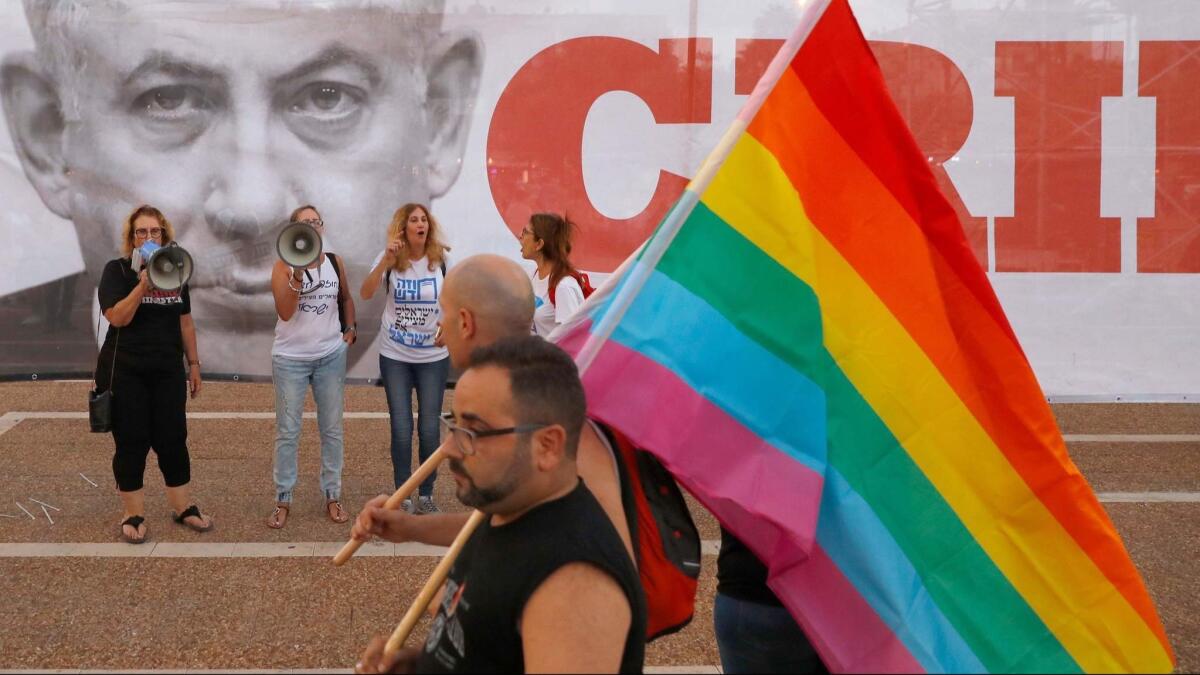Debate over surrogacy draws tens of thousands of Israelis into the streets

- Share via
Reporting from Jerusalem — In an extraordinary public protest, tens of thousands of Israelis poured into the streets across the country Sunday to voice their displeasure with Prime Minister Benjamin Netanyahu.
“Shame! Shame!” they shouted.
The issue was not Gaza policy or the controversial nation-state law favoring Jews over Arabs. It was the government’s refusal to pay for single men or gay male couples to have children using surrogates.
Israel’s welfare system has long paid for surrogacy for single women and married heterosexual couples who are unable to have children on their own. Typically, an embryo created through in vitro fertilization is implanted in a woman who then carries the fetus to term.
Last Monday, Netanyahu announced that he’d support an amendment extending state subsidies for surrogacy to single men and gay couples — a move that apparently upset religious conservatives in his fragile coalition government.
Two days later in the parliament, or Knesset, he voted against it without explanation, and the amendment narrowly failed.
The protest began the same day, as members of the LGBTQ communities in Tel Aviv and Jerusalem gathered spontaneously to demonstrate. By Thursday, technology companies that have sustained Israel’s reputation as the “start-up nation” had joined the cause.
Microsoft’s Israel affiliate announced that it would pay 60,000 shekels, about $16,500, for any gay employee to use a surrogate.
“My heart is with each and every employee in their desire to create a family,” said Assaf Rappaport, the chief executive of Microsoft’s research and development center in Israel.
IBM issued a statement Friday decrying the law: “No one should be denied one of the most basic human rights — the right to start a family — for being who they are. We support IBMers who wish to stand in solidarity with the LGBT community in advocating for legislation that is inclusive of ALL.”
Dozens of other companies agreed to give their employees the day off on Sunday — normally a workday here — to protest. In Jerusalem, dozens of protesters blocked the square facing the prime minister’s residence. In Haifa, protesters showed up with empty strollers.
A few hours before the start of Sunday’s nationwide protests, Apple Inc. released a statement supporting the Israeli campaign.
“One of Israel’s greatest gifts is the creativity, diversity and talent of all of its people,” it said. “Unfortunately, recent legislation passed by the Knesset undermines those values. Apple will always maintain its values of fairness, dignity, and mutual respect, and we stand with all of our employees seeking equality under the law.”
Even trade unions, which are traditionally conservative, granted their employees a day off, causing some delays at the national electric company and Ben Gurion International Airport.
Marching alongside thousands of protesters, Tel Aviv Mayor Ron Huldai said, “These people are protesting for something so basic, just human rights, against a government and a prime minister who misleads us. This is apparently the moment when the straw broke the camel’s back. There is an awakening.”
Around him, marchers chanted, “Netanyahu! Homophobe! We are here, we are everywhere!”
The protest there morphed into a general outcry against several conservative laws passed last week before the start of a three-month summer recess. The most controversial was the nation-state law, which defines Israel as “the national home of the Jewish people” and downgrades Arabic from an official language to one with an undefined “special status.”
As the magnitude of Sunday’s protests became clear, senior Israeli officials began to signal the possibility of reversing course.
Minister of Culture Miri Regev, who voted against the amendment that would have paid for surrogacy for gay men, said in a television interview that the government would review the law.
“We mucked up with surrogacy,” she said. “I regret that coalition obligations forced us to do so.”
Netanyahu told gay rights leaders he would meet with them “in the coming days.”
Itzik Shmuli, an opposition legislator who is gay, said the prime minister was “treating us as second-class citizens.”
More to Read
Sign up for Essential California
The most important California stories and recommendations in your inbox every morning.
You may occasionally receive promotional content from the Los Angeles Times.










